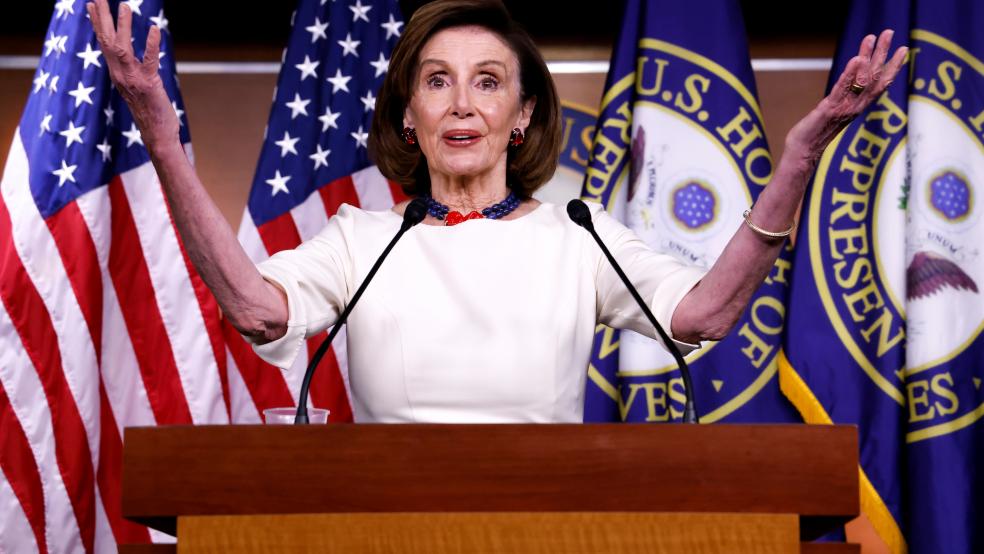As Democrats look to advance President Joe Biden’s stalled economic agenda in the wake of electoral embarrassments this week, House Speaker Nancy Pelosi (D-CA) is pressing for a vote on the party’s reconciliation package of social spending and climate measures as soon as Thursday evening, with another vote on the Senate-passed bipartisan infrastructure potentially to follow Friday morning.
“I was really very unhappy about not passing the [bipartisan infrastructure framework] last week. I really was very unhappy,” Pelosi told reporters Thursday. “So now we’re going to pass both bills but in order to do so we have to have votes for both bills, and that’s where we are.”
That means Democrats aren’t yet where they need to be. As of Thursday evening, Pelosi reportedly doesn’t yet have the votes needed to pass the $1.75 trillion budget plan as lawmakers continue to haggle over various details of the social spending legislation, including its immigration provisions, the details of a plan to lower prescription drug prices and proposed changes to the current $10,000 cap on the deductibility of state and local taxes.
Split on SALT: The House bill would lift the cap to $72,500 through 2031, but Sens. Bernie Sanders (I-VT) and Bob Menendez (D-NJ) have proposed leaving the cap at $10,000 but having it apply only to taxpayers making more than $400,000 a year.
“While the $10,000 cap is much too low, eliminating the cap entirely would result in a massive tax break for the wealthiest families in this country,” Sanders said at a press conference Wednesday. “The multimillionaires and billionaires who own mansions in exclusive neighborhoods, and who can afford to make extremely expensive purchases do not need a tax break.”
A number of centrists also want more time to review the legislative text, which runs more than 2,100 pages long, and have said that they won’t support the bill before they see cost and revenue estimates for it from the Congressional Budget Office (CBO) and the congressional Joint Committee on Taxation (JCT).
The CBO score could still take days, meaning it won’t be ready in Pelosi’s timeframe, but Pelosi on Thursday touted revenue estimates released Thursday by the JCT, which showed that the new spending is essentially paid for (see more on this below). The JCT numbers may not be enough to overcome centrists’ concerns, though. “They’re also worried about changes to prescription drug pricing and immigration,” Punchbowl News reported Thursday morning. “In sum, moderates really want to just slow this whole thing down in order to extract more changes to the legislation. That’s what the demand for CBO score is, in part -- a stalling tactic.”
Moving ahead without Manchin: The race to vote on the two major pieces of legislation represents another tactical turn by Pelosi, who has been forced to change course a number of times as she tries to herd obstreperous Democratic lawmakers toward passing both bills.
Pelosi initially said the House would only take up the infrastructure bill after the Senate passed the larger budget package. She also promised her members that she would only make them vote on a reconciliation bill that could pass the Senate — and yet Sen. Joe Manchin (D-WV) has made clear that he still isn’t on board with the latest version of the legislation. “I have a lot of concerns, let’s put it that way,” Manchin told Fox News Wednesday night. “They’re working off the House bill. That’s not going to be the bill I work off of.”
But House Democrats have apparently tired of trying to win over Manchin. The House bill now includes policies that Manchin has rejected, including four weeks of paid leave and an expansion of Medicare to cover hearing benefits. “Many House Democrats now believe Manchin will never verbally voice support for a package and that voting on their own House bill is the only way to put pressure on Manchin and break the intraparty stalemate,” The Hill reports, adding that Pelosi said of the West Virginia senator: "We hope that he will see the light of day.”
Moving ahead without Manchin carries risks, though, since it erodes the linkage between the two big bills, potentially allowing the Senate to strip out elements of the House version of the budget package and send the revised version back for another House vote — a process that would lengthen the time it takes to pass the plan.
“I wouldn’t be surprised at all if, between the parliamentarian and Joe [Manchin]’s concerns ... whatever the House sends will have to be modified at least a little,” Sen. Brian Schatz (D-HI) told Politico. “It will not be enacted as is. Everybody needs to sit with that and get comfortable with it.”





